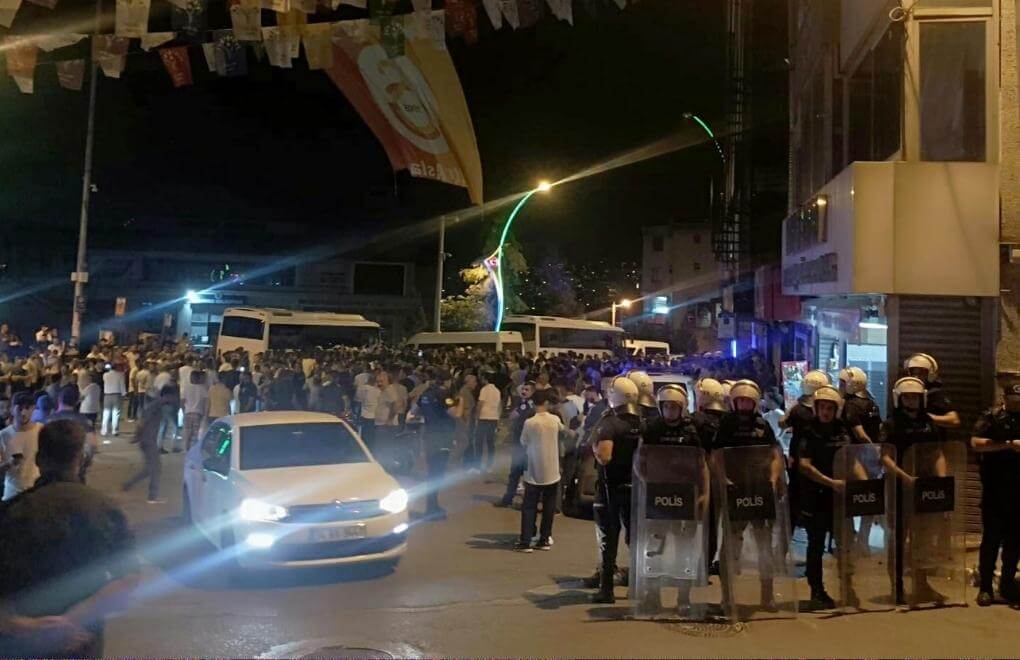Tension has escalated in the Dilovası district of Turkey’s northwestern Kocaeli province, where locals took to the streets following a series of events that started with the allegation that a Syrian refugee had poisoned a dog owned by a Turkish resident, the Serbestiyet news website reported on Monday.
According to the report, after it was alleged that a Syrian had killed the pet dog, locals in the neighborhood confronted the individual, prompting a group of Syrians to arrive at the scene.
A large group of locals in Dilovası started a march, shouting slogans such as “We don’t want refugees in our country” after allegations that the Syrian group, armed with stones and sticks, was aiming to “raid” a home in the neighborhood began circulating on social media.
Both nationalist İYİ (Good) Party Kocaeli deputy Lütfü Türkkan and Ümit Özdağ, leader of the far-right, anti-refugee Victory Party (ZP), portrayed the allegation of Syrians raiding locals’ homes as if it were true in their tweets.
“The incidents that started with Syrians raiding a house in my city … continued tonight with people taking to the streets. … Tomorrow evening, they will gather in front of the district governor’s office and demand that Syrians leave Dilovası,” Türkkan said.
Kentim Kocaeli Dilovası’nda Suriyelilerin bir evi basması üzerine başlayan hadiseler bu gece halkın sokağa çıkması ile devam etti.
Vatandaşlar şimdi dağılıyor. Yarın akşam Kaymakamlık önünde toplanıp, Suriyeliler’in Dilovası’nı terketmesini isteyecekler. pic.twitter.com/6jM2VuzbCa— Lütfü Türkkan (@LutfuTurkkan) July 2, 2023
“Last night around midnight, a group of Syrians were seen hitting stray dogs with sticks. Dilovası residents intervened in the situation. Subsequently, the refugee group attacked citizens’ houses, and then a large crowd retaliated against them,” Özdağ said.
Dün gece 24.00 sularında bir grup Suriyeli sokak köpeklerine odunla vuruyor. Bunu gören Dilovallar olaya müdahale ediyor. Ardından sığınmacı grup vatandaşların evine saldırıyor. Ardından kalabalık bir grupta onlara saldırıyor. Polis olaya müdahale ediyor. @zaferpartisi pic.twitter.com/tFNXwr7X0r
— Ümit Özdağ (@umitozdag) July 2, 2023
Serbestiyet said 10 foreigners who were identified to have been involved in the incident have been sent to a deportation center for removal from Turkey.
Taha Elgazi, a member of the Asylum Rights Platform, told Serbestiyet that Syrian refugees in Dilovası were afraid and staying indoors following the incidents.
“[Syrian] workers didn’t go to their jobs and children didn’t go out on the streets because they are afraid that this might escalate into a mass lynching attempt,” Elgazi said.
Both the Kocaeli Governor’s Office and the provincial police denied the allegations that a group of Syrians had raided houses belonging to locals in Dilovası.
The governor’s office said in a written statement on Monday that although there have been videos shared on social media claiming that Syrians attacked homes belonging to Turks, it has been determined that the individuals in those videos aren’t foreign nationals but rather the person whose dog was killed and his relatives.
“It is respectfully announced to the public that the news and footage published, which is false and aimed at provocation, should not be trusted,” the office added.
The police also said in a written statement that the individuals involved in the incident have been apprehended and that blood samples have been taken from the dog to determine the cause of its death.
Green Left Party (YSP) lawmaker Ömer Faruk Gergerlioğlu on Monday told the T24 news website that the disputes in Dilovası started with a simple criminal incident and that it’s important for the offices of the governor and district governor to be sensitive about the developments so as to prevent them from leading to a lynching.
According to Gergerlioğlu, the incident started with a Turkish man’s dog being stoned by Syrian children aged 7 or 8. The man reportedly slapped the children and then had an argument with the children’s fathers over why their children were slapped. The MP said the dog was found poisoned and died the next day, which sparked another fight between the two sides. Several people were slightly injured during the altercation.
Main opposition Republican People’s Party (CHP) Kocaeli MP Nail Çiler also told T24 that the number of migrants has recently increased in Dilovası. He added that the incident should not be considered a simple criminal case and that they are concerned about the escalation of such incidents.
Turkey hosts the largest refugee population in the world, with a population of nearly 3.6 million individuals seeking shelter, according to the latest global trends report released by the United Nations High Commissioner for Refugees (UNHCR) last month.
Refugees in Turkey are frequently targeted by Turkish politicians, who hold them responsible for the social and economic problems in the country. The anti-Syrian rhetoric has gained momentum, especially during the period of May 14 elections and the May 28 presidential runoff.



